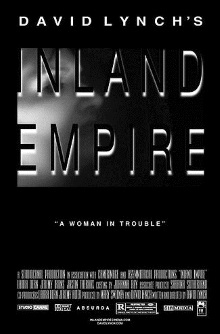
One of the earliest ever posts on this blog about movies is this list of some of my favorite films, written in 2007. Strangely, even after years of watching more movies and becoming more familiar with the classics of cinema, this list is still a fairly good representation of what I like. Anyway, one of the entries there was David Lynch’s Mulholland Drive. Over the years I’ve gone back and watched his earlier films like Lost Highway and Blue Velvet. While some of these can feel more visceral and therefore are more emotionally resonant, I’ve always felt that Mulholland Drive, due to its high production values and greater sense of coherence, represented Lynch at his peak.
Inland Empire, released in 2006, was Lynch’s first movie since Mulholland Drive. It is also the last movie he has made since then, discounting his art projects and short films. In many ways, it’s the inverse of the earlier movie. It’s shot entirely using a digital camera, often as handheld shaky cam, and the lighting can charitably be classified as home-video quality. The acting talent, featuring Lynch regulars like Laura Dern, Justin Theroux and Jeremy Irons, is still top tier of course, but everything else looks cheap. This gives this film a raw and ugly look that contributes to its shock value. Unfortunately it also contributes to making this feel like a homebrew project in which everyone, from Lynch down to the performers, are making it up as they go along.
This turns out to actually be true since Lynch apparently shot this without a complete screenplay, writing new pages of dialog each day and giving them to the actors just before shooting. So if you’re feeling confused about what the film is about, you have good reason to be. Even the actors claimed not to understand a thing about what happens in the film. Dern plays an actress named Nikki Grace who has just landed a role in a new film. The film may or may not be cursed. Nikki Grace may or may not be having an affair with her co-star, played by Theroux. Nikki may have become so embroiled in her role that she has gone insane or the film may be a gate into a parallel reality. This may or may not all be happening inside a show that an unnamed prostitute is watching on a television in a hotel room somewhere.
The lack of anything resembling a coherent plot makes this a very tedious watch with a running time of three hours. I understand that instead of a continuous narrative, the idea here is that recurrent motifs are meant to pull the film together. That’s why you have the phrase “blue tomorrows” pop up in conversation, the title of the film Nikki is working on. That’s why you have the image of a grinning man with a distorted face. But it’s not just that Inland Empire lacks a plot, it even lacks any real characterization. As weird as Mulholland Drive got, it actually has real characters whose motivations you can comprehend and that you can empathize with. This is just plain weird with no sense of what drives the characters or who they are.
What’s left is a series of scenes and images that are barely connected to one another. Lynch’s genius is such that plenty of these scenes are still surprisingly effective, particularly in fostering a creeping sense of dread that suffuses the entire work. The recurrent shot of domestic scene with anthropomorphized rabbits is a great example. Also notable is how he manages to scare and shock you by asking the performers to behave in strange and unexpected ways. Laura Dern’s unsettling, loping gait as she moves closer and closer to the camera in one scene being the premier example.
This might be enough to sustain an hour and half long film but definitely not one twice that length. Worst of all is the sense that all of the disparate elements here are mere remixes of the same ideas and themes that we’ve seen before in previous Lynch films: the disturbed actress, the distorted grimace, the weird cabaret performance, the mysterious message, vaguely threatening old men with gnarled faces and so on. I’m reminded of my cinephile friend’s comment that all film auteurs ultimately just make the single, same film over and over and over again. There’s nothing really new here and it’s not different enough from his previous work to justify sitting through it.
That’s why I think it’s impossible to recommend this one even to established fans of David Lynch. You’re simply better off going back to watch one of his earlier works again.